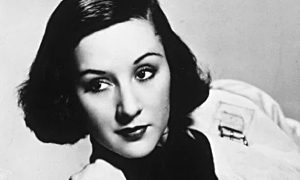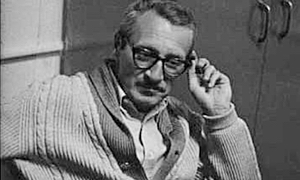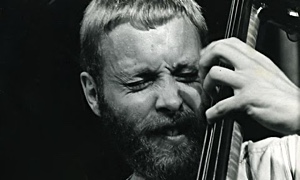Home » Jazz Articles » First Time I Saw » Coda For Elvin
Coda For Elvin
With a sly smile he ticked his ride cymbal once with his drumstick. The rivets shimmered. He pumped his bass drum, then hit his snare once with his left hand. There in just those three notes was the unmistakable Elvin Jones sound.
It had been over 40 years since I'd seen Elvin Jones in person. Now here he was at 72-plus years of age, appearing with his Jazz Machine at the Regattabar in Cambridge, Mass., an exquisitely intimate room with a sound just perfect for acoustic jazz. Outside a March rainstorm swept the streets and tapped staccato notes on the windows. As the place began to fill up, I estimated that at least one-third of the people there were drummers. I deduced this from the fact that just about every third person there made their way up to the bandstand to peer intently at Elvin's glittering gold drum kit. A couple surreptitiously touched his ride cymbal. Others craned around behind the bass drum for a peek at his pedal. They were looking for anything that might give them an insight into how this guy does what he does.
At precisely 8:35pm, Elvin Jones seemed to suddenly materialize softly, like a shadow at the front of the bandstand, which in this room, is at floor level. With his back to the audience, Elvin stared down at his drum kit like a guy inspecting a car he was thinking of buying. There was still the same square-shouldered, athletic build and unmistakable feline-shaped head that I remembered seeing on numerous occasions when he was playing with Coltrane at the Half-Note in New York. And that was over four decades ago. But clearly something was different now too. He seemed hesitant. A little off balance even. And when he did finally take a tentative step towards the drums, he wavered, as if he thought the floor was moving beneath him. A small female hand reached up and touched his back gently, reassuringly and disappeared again. Elvin baby-stepped gingerly around his hi-hat and turned his face towards the audience as he took his seat. There was that amazingly muscular face, that unmistakably brilliant smile with the endearing overbite, those dancing, intense eyes, cat-like one moment, child-like the next, and that broad forehead slanted like the hood ornament on a '53 Pontiac.
His quintet of young players, all dressed in black T-shirts with white Ziljan logos, took up their instruments and looked towards Elvin respectfully. With a sly smile he ticked his ride cymbal once with his drumstick. The rivets shimmered. He pumped his bass drum, then hit his snare once with his left hand. There in just those three notes was the unmistakable Elvin Jones sound. He built those three notes into a coherent but restrained 8-bar solo that kicked off a medium tempo rendition of "Caravan." There were the familiar left handed snare drum cracks and flourishes and the astounding 16th note rolls, that gently sliding ride cymbal motion, and the explosive bass drum punctuations. And that smile that lit up the bandstand.
The audience was with him from the git go, nodding at the complex recurring phrases only Elvin's left hand ever played. There were no long solos and no great soul-changing crescendos' the group as an ensemble seemed together and comfortable. They swung, but in a somewhat restrained way. ("Restrained" perhaps only when unfairly compared to the original and unparalleled Coltrane Quartet.)
After the first tune, Mrs. Jones, Elvin's petit and ever-attentive Japanese wife, stepped up and handed him a bottle of water, un-capped. There was a slightly awkward silence as the great drummer quenched his thirst and then seemed about to say something. He smiled to himself as though he'd changed his mind about what he was going to say.
"At's nice water," he said softly, looking down at his snare drum, then smiling up at the audience.
The Jazz Machine played four more tunes, one in 6/8, all at moderate to medium-slow tempos. When they slowed way down to play "What a Wonderful World," much of the energy seemed to go out of the group, although Elvin kept smiling and growling to himself. After every tune his wife gave him water. Once she reached across his hi-hat to remove an invisible fleck of something from his prominent cheekbone. Elvin just kept smiling.
Throughout the set, Elvin never took the mike. Nobody announced the tunes. And at the end, the bassist gave the names of the rest of the band as Elvin rose to acknowledge a standing ovation. The sweat was not pouring off him profusely the way it used to when he played with Coltrane. He seemed energized by the music but as he got up from behind his drums, he teetered again, taking slow, careful little side steps towards the edge of the stage area, like a man on a cliff's edge.
Before he disappeared, Elvin's wife took the mike and in a very heavy Japanese accent, informed us that Elvin had been hospitalized for "heart failure" back in mid-January. He had just been released less than two weeks prior to this gig.
"But even while he wur sick," Mrs. Jones explained earnestly, "he always talk about his drums."
The crowd erupted again with standing applause, which Elvin acknowledged with his giant smile and a nod.
At the end of the set, I was filled with mixed emotions. On the one hand, I was thrilled just to see Elvin Jones after all these years and delighted that he still played with such originality and creativity. On the other hand, I hated seeing him so frail. He had always been such a presence at the drums, such a force of Nature, such a musical athlete, that to see him having to hold on to his wife's forearm to walk from the stage made me sad and worried for him.
It made me wonder: should a truly great artist quit at the top of his game and leave his public wanting more, remembering him at his greatest? Or should they soldier on, at the risk of becoming stale or worse—a parody of their former selves? Elvin had not reached that stage yet. And who knows? He may be back to full-speed again soon.
And wouldn't that be wonderful.
< Previous
A Charlie Brown Christmas
Next >
Concerts
Comments
Tags
For the Love of Jazz
 All About Jazz has been a pillar of jazz since 1995, championing it as an art form and, more importantly, supporting the musicians who create it. Our enduring commitment has made "AAJ" one of the most culturally important websites of its kind, read by hundreds of thousands of fans, musicians and industry figures every month.
All About Jazz has been a pillar of jazz since 1995, championing it as an art form and, more importantly, supporting the musicians who create it. Our enduring commitment has made "AAJ" one of the most culturally important websites of its kind, read by hundreds of thousands of fans, musicians and industry figures every month.























